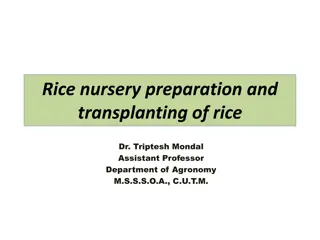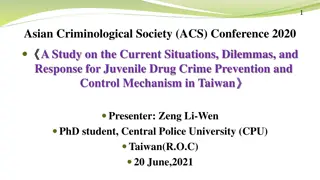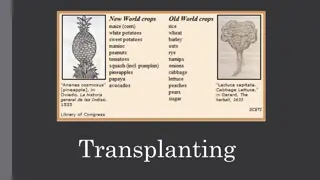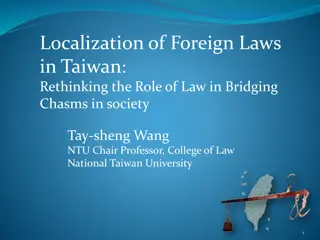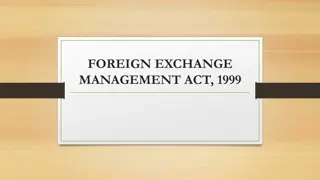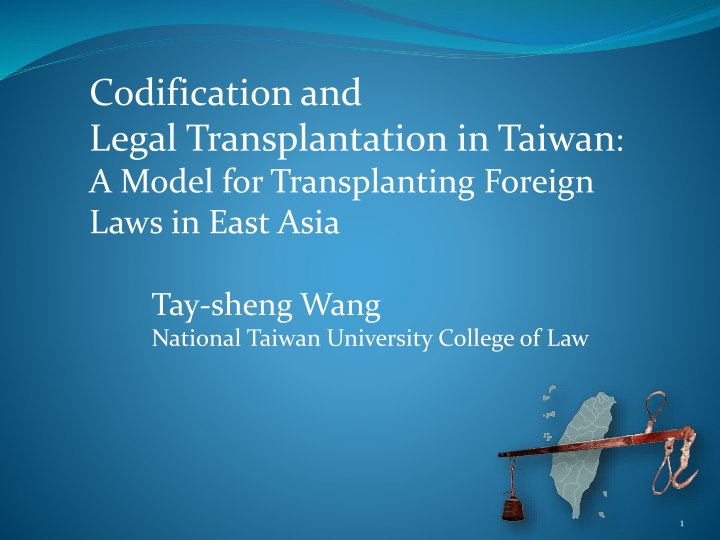
Legal Transplantation in Taiwan: A Story of Foreign Law Influence
Explore the fascinating journey of legal transplantation in Taiwan, where modern codes from Meiji Japan and Republican China have been integrated into the legal system. Witness how Taiwan's legal uniqueness emerged through the adoption of multiple foreign laws, shaping a progressive legal landscape.
Download Presentation

Please find below an Image/Link to download the presentation.
The content on the website is provided AS IS for your information and personal use only. It may not be sold, licensed, or shared on other websites without obtaining consent from the author. If you encounter any issues during the download, it is possible that the publisher has removed the file from their server.
You are allowed to download the files provided on this website for personal or commercial use, subject to the condition that they are used lawfully. All files are the property of their respective owners.
The content on the website is provided AS IS for your information and personal use only. It may not be sold, licensed, or shared on other websites without obtaining consent from the author.
E N D
Presentation Transcript
Codification and Legal Transplantation in Taiwan: A Model for Transplanting Foreign Laws in East Asia Tay-sheng Wang National Taiwan University College of Law 1
Introduction The first modern-style codes implemented in Taiwan were nevertheless products of the modernization of Meiji Japan, the first country to receive modern law in East Asia. Furthermore, the modernized codes that are effective in today s Taiwan came, surprisingly, from Republican China (1911-1949) since 1945, after China s long struggle for legal modernization from the late Qing era, and were unfortunately rejected by Communist China in 1949. 2
However, after Taiwan became a liberal and democratic country in the 1990s, the Taiwanese legal system underwent many reforms. Taiwan has thus shaped her own uniqueness in law using multiple foreign laws, namely, the laws of modern and contemporary West, prewar Japan, and Republican China. From the story of Taiwanese law, we can reconsider the significance of codification for the transplantation of foreign law and its impact on domestic people. 3
I. Legal Transplantation Involving Japanese Modern Codes and Taiwanese Customary Law Under the colonial rule of the prewar Japanese empire, the Taiwanese, composed of Han Chinese immigrants on Taiwan and plains aborigines assimilated by those Han Chinese immigrants, were exposed to a modern law which had been brought and implemented by the Japanese authorities. However, only few of the mountain aborigines in colonial Taiwan had access to modern-style laws under the Japanese separation policy toward them during the fifty-year Japanese rule (1895-1945). In fact, when acquiring this overseas colony, Meiji Japan had merely begun to modernize her own laws to a large degree under pressure from Western powers. 4
The Meiji government used the continental European codes, at first the French and later the German, for their models because the American and English common laws, as well as Japanese customary laws, were not in a sufficiently coherent form that would enable the Japanese to adopt them as solutions to their urgent diplomatic or systematization problems. The 1880 Criminal Code and the 1880 Code of Criminal Instruction, which were the first modern codes of Japan, were based on drafts made by a French advisor. The official justification given for enacting these legal codes was to end extraterritoriality. 5
In the 1880s, the absolutist character of the Prussian Empire was more attractive to Meiji leaders than either the government of France or England, where democratic liberalism prevailed. This political selection further influenced the later development of Japan's legal codes and jurisprudence, including the 1889 Meiji Constitution, which inclined to executive supremacy. Accordingly, the 1890 Code of Civil Procedure was modeled on German law. The first three books of the Civil Code were finally enacted in 1896 and to a large degree influenced by German jurisprudence. The last two books (family and succession) of the Civil Code were enacted in 1898 and maintained the patriarchal family system for supporting prewar Japan s family state ideology of the Emperor system. 6
The Meiji government established a special legal system for its rule in colonial Taiwan. Generally where areas of law significantly concerned the authority of the ruling colonial power, they predominantly accorded with the mother country s law. In contrast, most of those areas of law that concerned the daily life of ordinary people complied with native legal rules so as to avoid resistance to the new regime. The criminal code, the code of criminal procedure, and the code of civil procedure of prewar Japan were thus enforced in Taiwan almost from the beginning of colonial rule. Nevertheless, some modern elements in these codes had been given up due to the enactment of several special laws in colonial Taiwan that in practice maintained Chinese legal traditions against modernity. 7
Accordingly, the Japanese colonialists employed the Taiwanese customary law, recognized by colonial courts or administrative organs, to deal with Taiwanese civil and commercial matters. The colonial government had established an institute to find the legal rules existing in Taiwan s old customs, meaning that the law implemented by the old government would be interpreted using the jurisprudence and terminology of modern European, especially German, law. The Taiwanese customary law was indeed a product of modernization. Using customary law was more desirable for the general public in East Asian societies because their legal practices and traditional values would be seriously taken into consideration. Ironically, this path was rejected in metropolitan Japan, but carried out in colonial Taiwan. 8
The colonial government was further engaged in the codification of the Taiwanese customary law. The drafts of Taiwan s civil and commercial laws, completed in 1914, not only codified the rules in the Taiwanese customary law, but also referred to and often actively incorporated the legal provisions in the civil and commercial codes of Japanese, German, French, and other Western countries. Nevertheless, a colony possessing its own civil and commercial codes within a specific jurisdiction would possibly promote the independence of the colony. The imperial government of Japan therefore rejected taking these drafts into effect. 9
Since 1923, under a policy of extension of the homeland, almost all of Japan s modern codes took effect in colonial Taiwan, with some exceptions. One of the exceptions, the Taiwanese family and succession matters were continuously decided according to customs. That, however, did not significantly obstruct the Taiwanese from modernizing their laws because the Japanese civil code on family and succession itself often excluded the modern law. Consequently, the Taiwanese became more familiar with modern law through the broad application of Japan s modernized codes under the Japanese colonial rule. 10
II. Legal Transplantation through the Modern Codes of Republican China and Foreign-trained Legal Scholars Because of the defeat of Japan in the Second World War in 1945, China under the administration of the Chinese Nationalist Party (Koumintang, KMT hereinafter) took over Taiwan on behalf of the Allies. The Japanese in colonial Taiwan were almost replaced by those people who migrated from the Chinese mainland after 1945 and mostly in 1949, called Mainlanders. Mainlanders also brought their legal codes and experience in Republican China to Taiwan. To reintegrate Taiwan into China, the legal codes of the Republic of China (ROC) promulgated by the KMT regime were immediately and completely taken into effect in Taiwan. 11
In order to eliminate Western extraterritoriality, late Qing China followed the example of Meiji Japan to draft modern-style codes with the assistance of Japanese jurists. Republican China was continuously engaged in the codification of modern Chinese law, and it finally promulgated civil, criminal, and various procedural codes of the ROC from the late 1920s to mid-1930s. These ROC codes were always modeled on continental European, especially German, codes with modern jurisprudence and terminology strongly influenced by prewar Japan. The native Taiwanese coincidently continued to receive modern law through the Japanese-oriented ROC codes without interruption despite the change of regimes, although neither Japanese codes nor the ROC codes were originally enacted for Taiwan and her people. 12
As a result of the defeat of the KMT in the Chinese civil war, the KMT-led ROC central government moved to Taiwan in December 1949. From then on, Taiwan became a de facto state, called the ROC on Taiwan. On the basis of its different territory and population, the ROC on Taiwan was actually quite different from the original ROC government that had been succeeded by the People's Republic of China (PRC) government, established on October 1, 1949. The KMT regime in Taiwan, however, still maintained the ROC legal system established in Republican China, with the enforcement of the wartime laws (until 1991), in large part for the purpose of proclaiming itself the legitimate government of China. 13
In postwar Taiwan, the majority of the first generation of Taiwanese legal scholars were Mainlanders, experiencing the codification of the ROC codes and their legal interpretations influenced by prewar Japanese law and jurisprudence, while a minority were native Taiwanese, having been trained under the Japanese. Not surprisingly, Japanese jurisprudence continued to dominate Taiwan s legal community in the 1950s and the 1960s. 14
The majority of the second generation of Taiwanese legal scholars, emerging from the mid-1960s onwards, went to West Germany for advanced studies. When they returned to Taiwan, they brought with them legal theories and laws of postwar West Germany. Some of these second- generation scholars went to Japan for advanced studies or frequently referred to legal materials written in Japanese in their legal reasoning. German jurisprudence, however, was admired in Japan as well. Therefore, postwar German jurisprudence, emphasizing constitutional democracy and dogmatic application of law, gradually prevailed in the legal community of Taiwan especially since the 1970s. 15
The third generation of Taiwanese legal scholars, emerging from the mid-1980s on, not only continued to transplant the laws and legal theories of Germany, Japan, and other countries of the Civil Law family to promote legal reform due to the democratization of Taiwan since the late 1980s, but also began to introduce Anglo-American laws and legal thoughts to Taiwan. Accordingly, the ROC codes that were initially utilized for the KMT s authoritarian rule in postwar Taiwan had been largely modified by the transplantation of liberal-oriented foreign laws and legal theories. 16
The fourth generation of Taiwanese legal scholars, emerging from the 2000s, on the one hand followed the direction mentioned above to endlessly strive to improve the legal lives of Taiwanese people, and on the other hand tried to have their own theories based on Taiwan s legal experiences in the global community, accompanying other generations of Taiwanese legal scholars. 17
Since the 1950s, the ROC on Taiwan had close political and economic ties with the USA. Early in the 1960s, American laws relating to the mortgage upon moveable property and securities exchange had been transplanted to the ROC legal system, whose legal codes actually belonged to the Civil Law family. In the 1980s, threatened by trade retaliations from the USA, the Taiwanese government adopted American-style punitive damages, which were not accepted in the German-based Civil Code, into Taiwan s intellectual property laws. American influence on Taiwan has become so strong that Taiwan s legislature wholeheartedly adopted the injunction system in American law when enacting the Family Violence Prevention Law in the 1990s, and introduced the US system of independent directors to laws relating to the corporate governance of large- scale companies in the 2000s. 18
III. Localization of Transplanted Codes and Legalization of Customs Taiwan s civil code that was promulgated in Republican China seventy years ago was to a large extent modified by a popularly- elected Taiwanese legislature in the late 1990s for the first time. The one-third of the provisions in the book on obligations of the ROC Civil Code had been revised in 1999 and became effective in 2000. This revision was mainly influenced by laws and legal theories of contemporary Germany and Japan; however, there still existed the distinctiveness of Taiwan on the grounds that foreign laws were selectively, not completely, adopted by Taiwanese jurists. In the 2000s, Taiwan s legislature, with the assistance of many Taiwanese legal scholars who were trained abroad, also significantly modified the book on rights over things in the Civil Code promulgated in 1929. 19
Interestingly, lots of customs from Taiwanese society were codified in the revision mentioned above. With the advent of the popularly-elected legislature in the 1990s, the customary law relating to hui ( ) was codified in the book on obligations of Taiwan s civil code since 1999, and tang ( ) has been regarded as one of the pledges in the book on rights over things of the civil code since 2007. The 2007 revision of the book on rights over things also codified the maximum amount mortgages, which derived from traditional Japan, became prevalent in colonial Taiwan, and was initially recognized by the court without written provisions under the ROC legal system. In fact, this revision carried out the aforementioned drafts made by the Japanese authorities for codifying Taiwanese customary law in 1914. 20
When the process of localizing the legal code begins, it means that the code transplanted from foreign countries has had its roots in the local society. Similar developments can be found in recent revisions of the criminal code and the codes of civil procedure, criminal procedure, and administrative litigations in Taiwan as well as the codification/enactment of certain customary laws, for example, regarding ancestor worship in Taiwan. 21
On the other hand, the Article 1059 of Taiwans civil code has given up the Han Chinese tradition that the surname of child should follow the father s one. After the 2007 revision of the book on family in Taiwan s civil code, household registration with the government has become required for a lawful marriage for the first time. Furthermore, Article 1148 of Taiwan s civil code completely violates the traditional principal of Han Chinese that sons are totally responsible for the debts of his deceased father. Assisted by well-trained Taiwanese jurists, the Taiwanese voluntarily choose to comply with the individualism and equity in gender that are prevalent in the contemporary West to reshape their own family and succession law. 22
Conclusion Through two alien regimes, codes originating from the modern West, but to a certain degree modified for the needs of prewar Japan or Republican China, were brought to Taiwan. After democratization in the late 1980s and the localization later on, the Taiwanese have used jurisprudence transplanted from the contemporary West to modify those codes received from Republican China for meeting the needs of today s Taiwan and, on the other hand, to eliminate outdated traditions. These kinds of legal transplants truly accord the fundamental spirit of the modern law, that is, freedom and equity. 23

